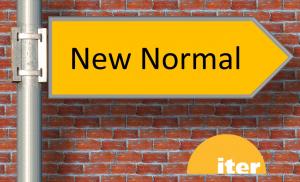ITER's New Normal
Learning from the COVID-19 experience
20 Oct 2020
-
Laban Coblentz, Head of Communication
The onset and persistence of the COVID-19 pandemic has altered behaviours in every societal sector. At ITER, the complexity of the project and the involvement of 35 countries on three continents compelled the rapid formation of a continuity plan, designed to prioritize critical activities. It also provided opportunities for ITER partners to learn from each other, and—perhaps ironically—to also learn from the positive aspects of new ways of working, initially forced by the coronavirus. This, in turn, has shaped a "New Normal" at the ITER Organization.
Over the past five years, ITER has built a culture of risk and opportunity management, in which challenges are evaluated in terms of both their potential negative impacts and what positive lessons can be learned, and the embedded opportunity that may lie hidden within any challenge. This culture shaped ITER's response to the challenges of the novel coronavirus.
Clearly, COVID-19 forced multiple new ways of working: not only the social distancing, frequent handwashing, and facemasks that have become ubiquitous in 2020, but also the evaluation of each position—staff and contractor—among the 4,500 individuals who normally work at the ITER site. Whose presence is essential, and when? Which functions can maintain productivity while teleworking? What are the consequences, good and bad, of forcing more digitalization—paperless approvals, online meetings, remote collaborations?
Not long after the 16 March lockdown across France, many at ITER began to notice the unanticipated benefits of the lockdown: less time spent commuting; greater capacity to multitask; more reliance on electronic processes; and, for many functions, a net increase, rather than a drop-off, in productivity.
Staff-wide surveys confirmed these results. Director-General Bernard Bigot asked for a team to be set up, led by Chief Strategist Takayoshi Omae, to review the data, consider more innovation, and develop a forward-thinking plan to incorporate the lessons learned into a longer-term approach that would endure beyond the pandemic: a "New Normal" for the ITER workplace.
On 1 October, following a two-month trial period marked by more surveys and analysis, the ITER New Normal was officially launched. ITER Organization staff now telework up to three days per week, based on the mutual assessment of the individual and the line manager to optimize the work outcome. Flexibility is built in to accommodate job functions ranging from accounting and recruitment to oversight of construction and assembly. Online meetings and digitalized signatures and processes are becoming the standard, rather than the backup approach. A weekly ITER Bulletin keeps everyone informed of news and progress; in fact, many staff members say they feel more connected and better informed than in pre-COVID times.
The pace of ITER assembly remains as intense and focused as always. But the New Normal has brought unexpected benefits, extending to environmental friendliness and improved quality of life. To sum up, less paper and petrol, equal or better productivity, and a smarter workplace.


